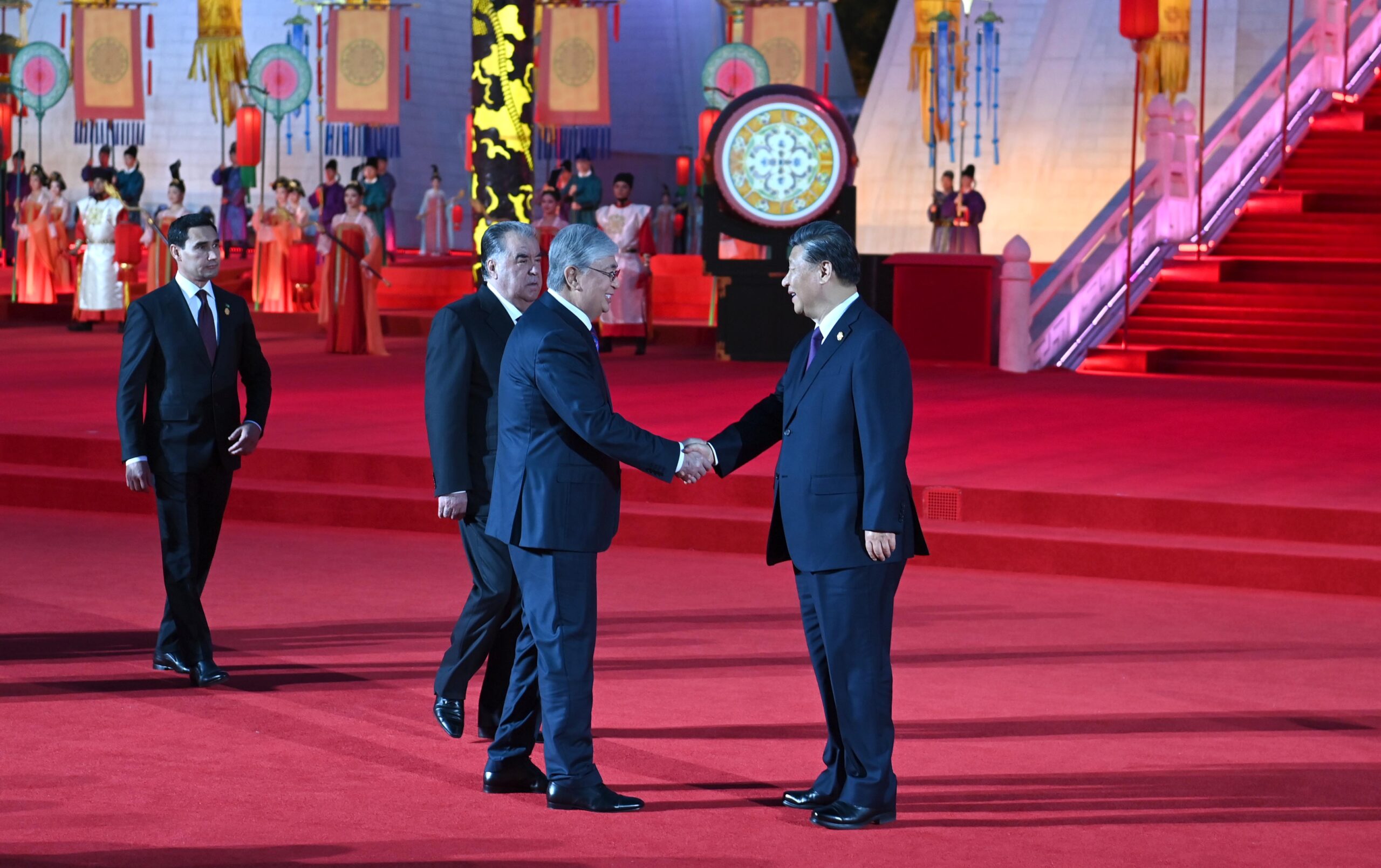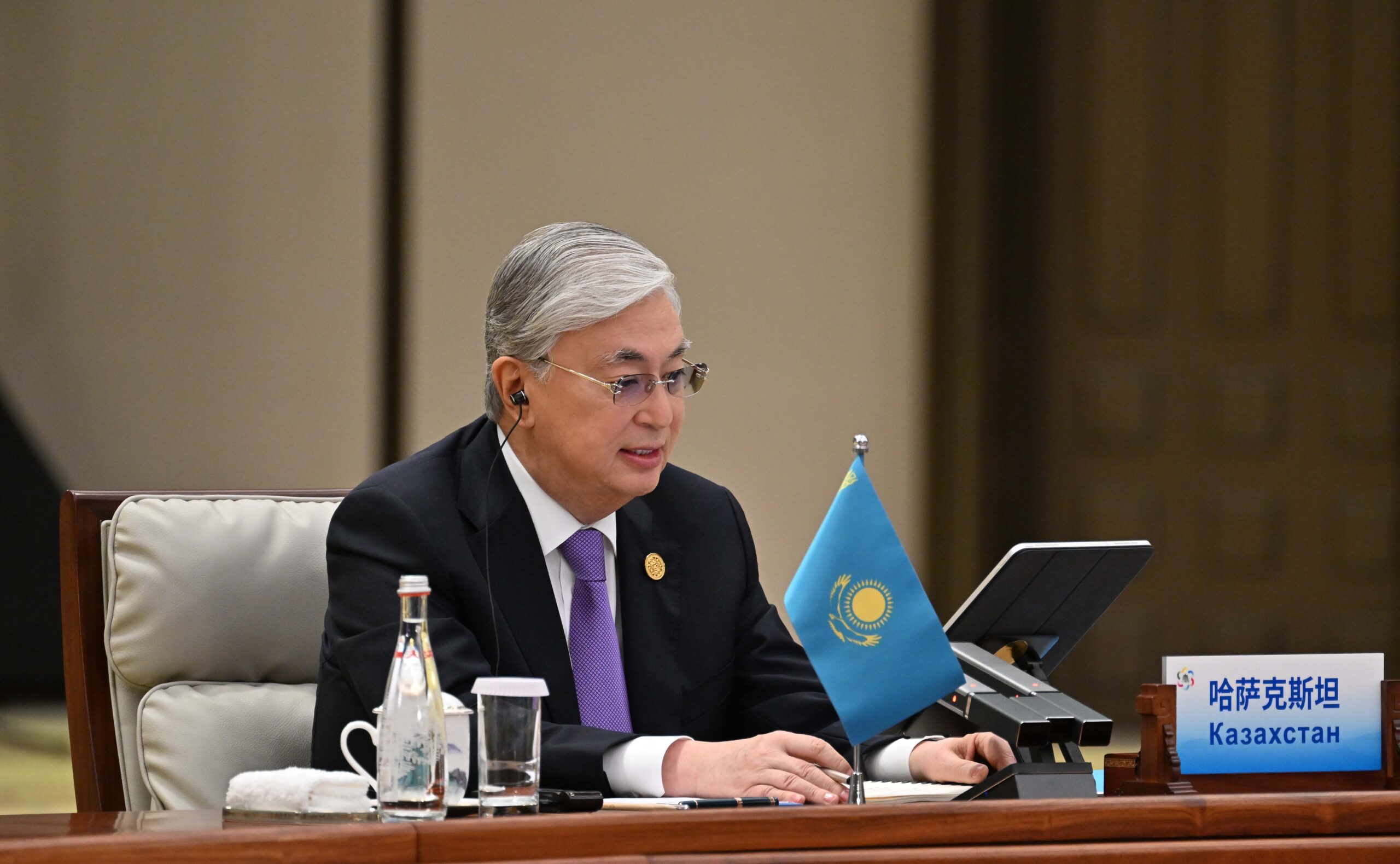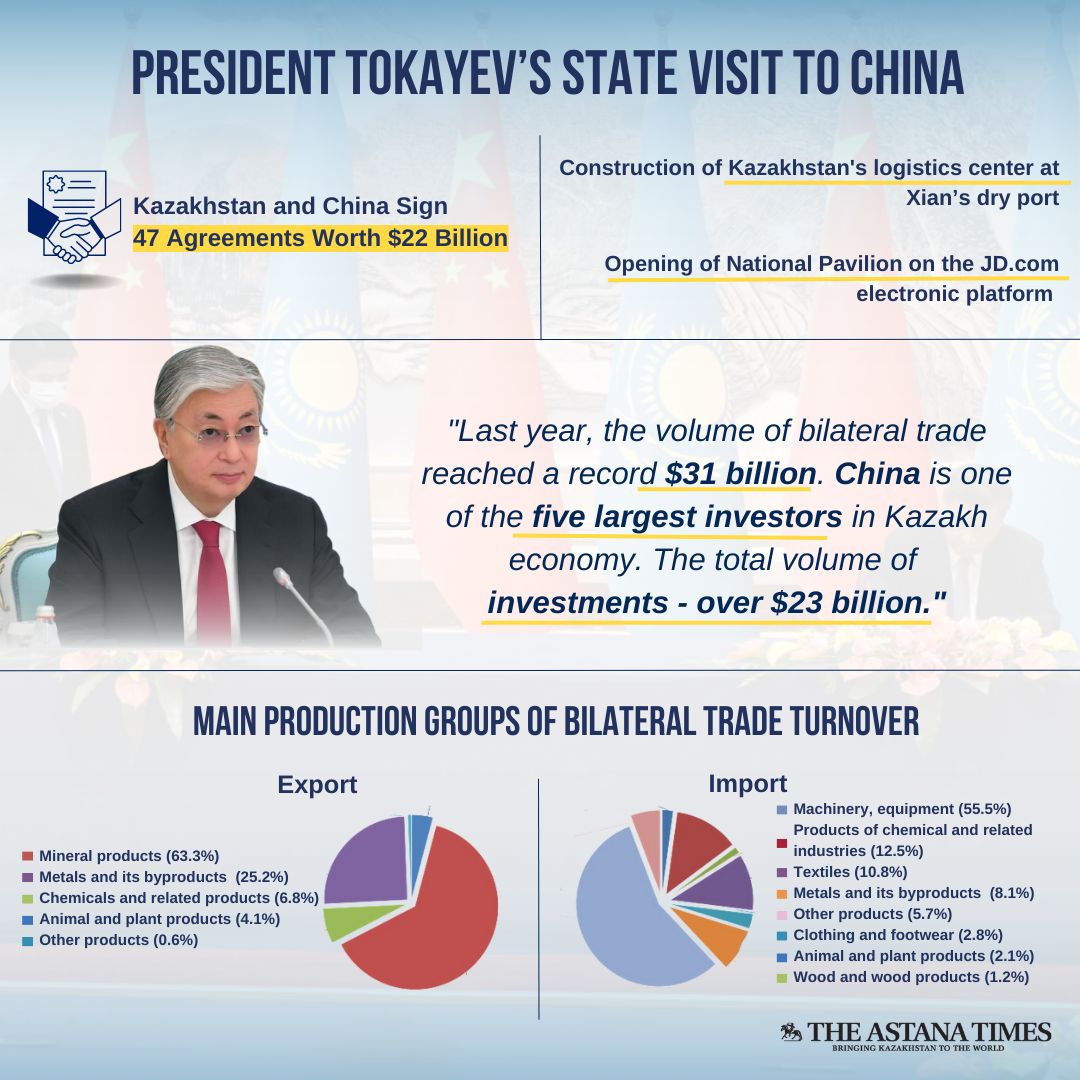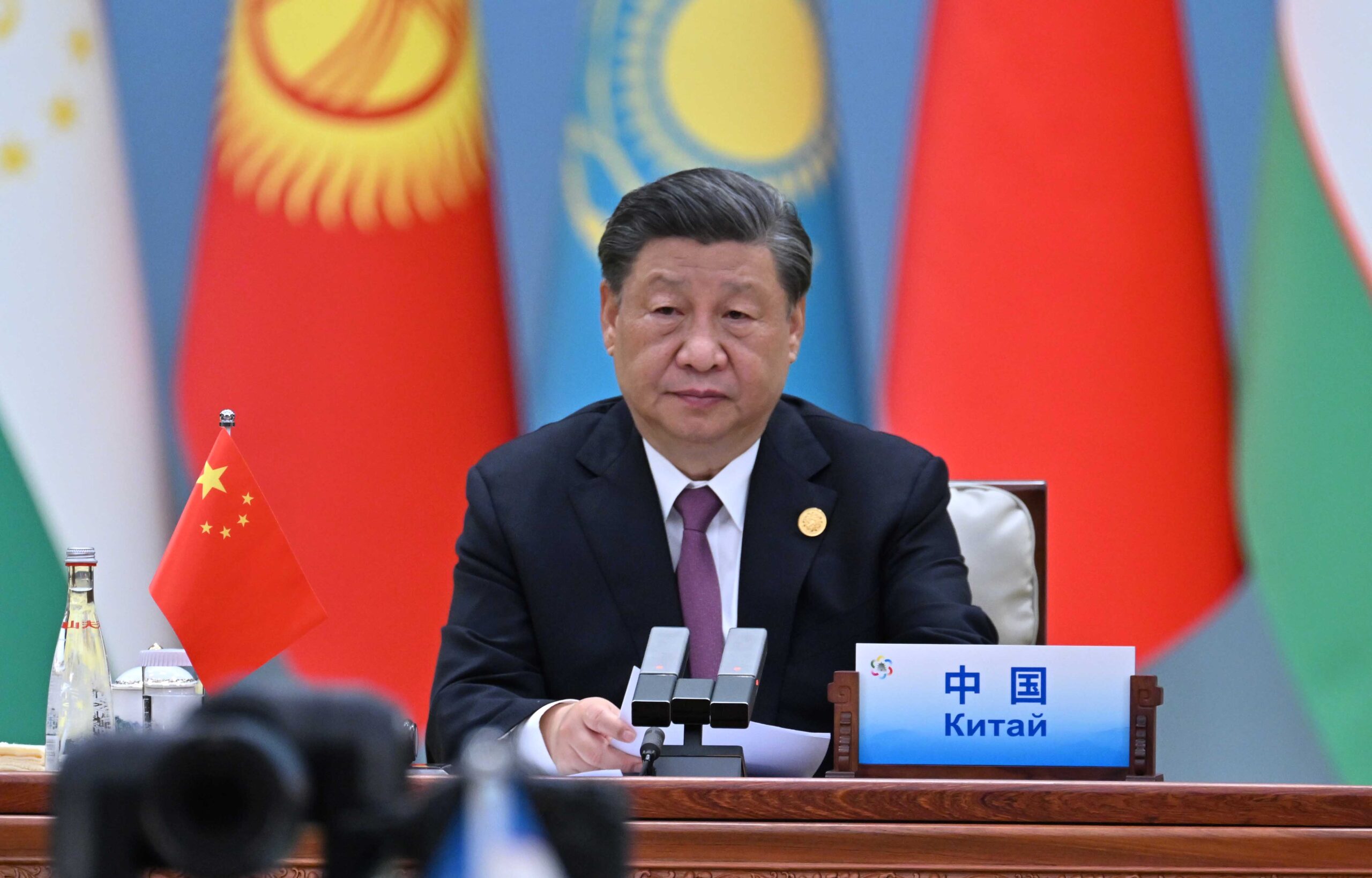ASTANA – Kazakh President Kassym-Jomart Tokayev’s state visit to China was a major highlight of last week. The milestone China-Central Asia summit on May 19, which welcomed Tokayev and other Central Asian leaders in Xian, drew global attention, with leaders reaffirming their plans to strengthen cooperation with China. According to Kazakhstan’s experts, the country should utilize the potential of neighboring a big economy like China.

Tokayev and Xi shake hands as Xi welcomes the Kazakh leader to the official opening ceremony of the China – Central Asia summit in Xian on May 18. Photo credit: akorda.kz.
During the summit, China’s President Xi Jinping emphasized the need to work together for a “shared future featuring mutual assistance, common development, universal security and everlasting friendship.” China signed bilateral agreements with each of the Central Asian states. Bilateral documents worth $22 billion were signed with Kazakhstan.
“The leaders of all five Central Asian countries have signed various agreements with China. But the format shows that Kazakhstan comes first,” Kazakh political expert Daniyar Ashimbaev told Time.kz.
He described the relationship with China as a “long-term strategic partnership.”

Tokayev addresses the summit on May 19. Photo credit: akorda.kz.
“Some projects are already being implemented, and some have been financed. But most importantly, both sides are very careful about the implementation of these agreements. The summit in Xian and the talks held the day before between Kassym-Jomart Tokayev and Xi Jinping show that this partnership is in the interests of both sides. All the more so because both countries supported each other in the painful issue of territorial integrity,” he noted.
The agreements between Kazakhstan and China span various sectors, including building a copper smelter in Kazakhstan, creating a small-knot production of Changan, Haval and Chery brand cars in the country, and building renewable energy facilities. Many of the goals outlined in these agreements align with the nation’s strategic objectives to diversify away from dependence on hydrocarbons, foster a knowledge-based economy and promote clean energy.

President Tokayev said in his remarks at the summit that intra-regional economic ties of Central Asian countries had reached a “qualitatively new level” and noted the growing trade between Central Asia and China. He proposed to increase region-wide trade with China to $100 billion by 2030, from $70 billion in 2022.
“The important thing here is to increase exports by expanding the trade nomenclature. For example, Kazakhstan can increase its exports to China in 135 non-resource commodity items. Last month, after three years of downtime due to the pandemic, we resumed operations at the Khorgos international trade center on the Kazakh-Chinese border. I invite all Central Asian countries, especially those without a common border with China, to share the potential of this important trade and logistics hub. Our plans include the construction with Chinese investment partners of a second dry port on the border on a qualitatively new basis, taking into account accumulated experience in this area,” said Tokayev.
Benefits from closer cooperation with China are clear-cut, said financial expert Andrei Chebotarev.
“It was not just a presidential visit, there were also negotiations on several levels, and signatures not only from the President. This is very good. We should take advantage of the fact that there is a market close to us, which can help expand our processing and agricultural industry. In almost any industry, we can look to China as a promising market,” the expert told Tengrinews.

Xi Jinping during the summit. Photo credit: akorda.kz.
China will most likely become the world’s largest economy by 2028, said Chebotarev. The country’s GDP is expected to grow by 5.2% in 2023, according to the International Monetary Fund (IMF).
Experts suggest that China’s reopening after the pandemic offers fresh momentum for the region and Asia, which will make up almost 70% of the global growth this year, according to the IMF, as its growth accelerates to 4.6 percent from 3.8 percent last year.
“By many parameters, China’s economy can already be called the largest. With such an economy next to us, it would be a mistake not to establish ties. In terms of population, China is smaller than India, but it is almost 100-times larger compared to Kazakhstan. It is a huge market, which we must take advantage of,” said Chebotarev.
In an exclusive interview with Chinese news channel CGTN a few days before the state visit, President Tokayev spoke positively about the cooperation with China and his vision moving forward. He said the bilateral ties are excellent, but the sides need to reach new agreements.
“China, because of its size and very long-term economic planning, can become a partner, under whose guaranteed investments the countries of the macro-region can harmonize their policies. In the worst case, we will expand our transport industry. At best, we will get a single Central Asian market with direct access to central China and the Indian Ocean, which would be a completely different reality,” said economist Kuanysh Zhaikov in an interview with Tengrinews.
In his address to the summit, Tokayev said full-scale engagement with China is a “long-term factor of sustainable progress for Kazakhstan.”
“The synergy of the potential of the Central Asian countries with the enormous economic opportunities of China can set a new, higher trajectory for our multifaceted partnership. Kazakhstan is ready to make every effort to achieve these ambitious goals. Kazakhstan is currently carrying out large-scale multidimensional reforms aimed at diversifying the national economy. Targeted work is underway to remove barriers and create the most favorable conditions for foreign investors,” said Tokayev.
President Xi, in turn, emphasized the Great Silk Road as a focal point connecting Central Asia and China. He offered his vision of the future of the region. The world needs a stable, prosperous, harmonious and interconnected Central Asia, he said.
He assured that “the sovereignty, security, independence and territorial integrity of Central Asian countries must be upheld; their people’s choice of development paths must be respected; and their efforts for peace, harmony and tranquility must be supported.”
Increasing trade, harnessing the potential of China’s huge e-commerce market, developing transport and logistics, deepening industrial relations, and expanding collaboration in agriculture and water management are the key priorities for cooperation that Tokayev outlined at the summit.
According to Kazakh political expert Talgat Kaliyev, Tokayev’s visit to China was productive, with a greater focus on technology, placement of production facilities in Kazakhstan, small-knot assembly in the automotive industry, and copper processing.
“The issue here is not of a raw material nature but of deep processing and technology transfer. The expansion of the capacity of the oil pipeline and cooperation in the gas sphere is another area. Agreements worth over $20 billion have been signed, which will certainly have a significant effect on Kazakhstan’s economy. It will help to create new jobs and, most importantly, to increase the competitiveness of Kazakhstan’s personnel and develop new technological chains and modern competencies by Kazakhstan’s workers,” Kaliyev told Tengrinews.
The China-Central Asia summit in Xian took place on the same day Almaty hosted the second European Union – Central Asia Economic Forum. It also coincided with the Group of Seven (G7) summit in Japan, where leaders considered additional measures targeting Russia and voiced growing concerns over China.
